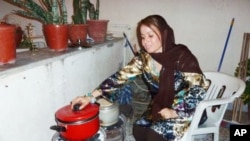Images of Libya’s uprising are overwhelmingly of men - typically rebel fighters firing their Kalashnikovs. But a visit behind the high walls of a family compound on a tree-lined street in Tripoli reveals the hidden contribution of Libyan women.
Ten steps from the burned hulk of a rebel car hit by a rocket-propelled grenade, Fatma Ghobtan cautiously opens the metal door to her compound. Walking past buckets of water and unwashed dishes in the front yard, she apologizes. “Sorry. Seven days we don’t have water, so we can’t clean everything,” said Ghobtan.
In addition to one week without running water, electricity is erratic. Lines for bread and gasoline are long. Libya has the 10th largest oil reserves in the world. But piped gas long ago stopped reaching the kitchen of Ghobtan. To make do, she cooks on charcoal grills improvised from car wheels.
“Here we make our bread. I put the charcoal down here, and comes the heat, and put the bread, and then we turn it off. And this is the way - how we make our food,” she said.
The compound tour continues past a clothes washer that gathers dust from lack of use. Ghobtan knows the value of water. A horticulturist, she takes care of decorative indoor plants at an international hotel that closed after Tripoli’s August 21 uprising. At home, she connects plastic pipes from her four air conditioners to catch drips - when the air conditioners are working. This way, she collects about 20 liters a day in plastic basins.
“For drinking we buy water, but this we use for anything for the house, for cleaning, for washing our body,” said Ghobtan.
The stress, conflict, and adjusting to life without utilities is taking its toll. In the last month, Ghobtan says, she has lost six kilos. But, reflecting in the quiet of her thickly carpeted living room, she says that there is more to modern life than running water. “We can live without water," said Ghobtan. "But there is something more important - Freedom!”
While Libyan women struggle to keep households running and families intact, they also are behind-the-scenes supporters of what many here refer to as ‘the revolution.’
Clandestine sewing work
A son of Moammar Gadhafi, Libya’s deposed dictator, lived several doors down from Ghobtan’s compound. Now, it turns out that women in houses surrounding the Gadhafi compound were secretly sewing the red, green and black flags of the rebels. She recalls asking a housewife friend.
“From where did you find the flag? She told me I have red T-shirt, black T-shirt, a white T-shirt. I just cut them. We made the flags. We are afraid to go buy the materials. Red - after that they will say, ‘come here, why are you buy these three colors?’ So everyone is going to one shop to buy the red color, another to buy the black color, another - the green color. A little tricky,” said Ghobtan.
This clandestine sewing work by Tripoli’s women may explain why rebel banners suddenly appeared across the city on uprising day - a sight that clearly unnerved Gadhafi's soldiers. She says that Libyan women have made a far greater sacrifice for regime change - their sons.
“The Libyan ladies worked a lot for this revolution, especially the mothers," said Ghobtan. "It is not easy to tell your son,‘take your bag and go.”
Supporting role
The household behind hers lost a young father - a 26-year-old man shot dead as he participated in the city’s first uprising - on February 20. She has a cousin who has six daughters and one son. All the same, the family supported the son’s decision to join the rebels. As she tells the story, this young man coincidentally calls her to extend Eid al Fitr greetings to his aunt. The brief conversation leaves her on the brink of tears.
“So I asked him what happened. He said 'I have seen things'. Thank God he is safe,” she said.
Behind every fighter in Libya, she says, there is a supporting mother or wife. “They are encouraging them, even the wives. It is not easy. We lost how many? 50,000. 50,000! They are the roses of the country. We miss them,” said Ghobtan.
Then domestic challenges return. She apologizes for a soot-streaked white cat that pads through the living room. She says the cat keeps tracking in dirt from the firefight that swept down her residential street last week.
Libyan Women Give Hidden Backing to Uprising
- By James Brooke




